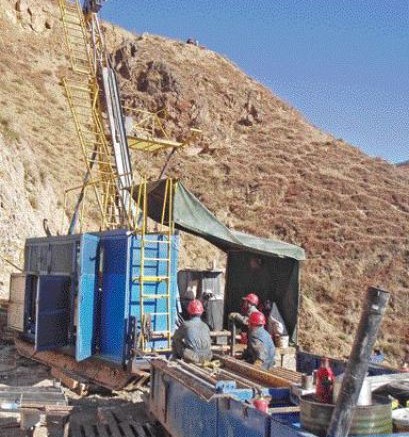Vancouver — A bombshell statement that Southwestern Resources (SWG-T, SWGGF-O) has retracted assay results from its flagship Boka gold project, in China, following the discovery of deficiencies in quality control, sent the company’s shares plunging as much as 80% and prompted immediate comparisons to the Bre-X Minerals Busang fiasco of a decade ago.
Southwestern believes the procedural shortcomings caused errors in reported assays from Boka, located in southern China’s Yunnan province.
The news comes on the heels of the resignation of the company’s former CEO, John Paterson, on June 19 (T.N.M., July 2-8/07). Citing “personal reasons,” the ex-CEO stepped down a day after Southwestern announced that its prefeasibility study for Boka, expected this summer, would be delayed until the end of the year.
Paterson was replaced temporarily by Timo Jauristo, who had been running Southwestern’s affiliate, Peruvian zinc-oxide explorer Zincore Metals (ZNC-T, ZCRMF-O).
Following Paterson’s departure, the company launched a review of Boka, with senior operating management and an independent consulting group hitting the ground in China. The review found that “the integrity of certain drill core samples was compromised.”
That discovery prompted the firing of John Zhang, Southwestern’s Yunnan-based general manager at Boka.
The events cast doubt on the company’s previously published resource estimates for Boka, prepared by SRK Consulting, which reviewed 20.9 million measured and indicated tonnes grading 2.9 grams gold per tonne on the Boka 1 North zone and 10.3 million tonnes grading 3.3 grams gold on Boka 1 South.
The company says it is continuing its review and will conduct additional field work and drill new holes.
“The problem we have is that our core is quite friable, so when we go back to take samples for metallurgical testing, we’re having some difficulty,” says Southwestern chairman David Black. “We’re having to drill some holes to get fresh metallurgical material.”
Black continues: “That really isn’t the issue — the issue is this business of the drill results not being consistent assay sheet to news release. John Paterson was in charge of that and he is not forthcoming to explain this.”
Southwestern has been using an independent contractor, part of the reputable Societ Gnrale de Surveillance (SGS) group, to do its sample preparation work in Kunming, Yunnan, about 65 km south of the project site. Both Chinese and Canadian laboratories had done assaying of the prepared samples.
Unlike the 1997 Bre-X scandal, which erupted after it was uncovered that samples from the company’s Busang gold project in Indonesia were salted, the issues discovered at Boka were identified by the company and appear to involve reported assay values — not the lab or rocks themselves — indicating that there is indeed significant gold mineralization at the project.
The 157-sq.-km Boka project is held through a sino-foreign joint venture between Southwestern and Team No. 209 of the Yunnan nuclear industry of Yunnan Province. The JV company, Yunnan Gold Mountain Mining, is held 90% by Southwestern’s subsidiary and 10% by its partner, which has a carried interest.
Mineralization at Boka is described as multi-phased gold-bearing veins and breccias hosted within an assemblage of sandstone, conglomerate, carbonaceous shale and gabbro.
The events have also precipitated a $220-million class action lawsuit, filed on July 20 against Southwestern by the law firms of Sutts Strosberg and Siskinds on behalf of anyone who acquired shares in the company between Aug. 31, 2005 and July 18, 2007.
Shares in Southwestern fell from around $6.00 to a low of $1.25 apiece on the assay news before settling in at the low-$2.00 range on high volume. With its 46.2 million shares outstanding, the company has seen its market capitalization decimated to around $100 million from about $277 million. The company reports a cash position of $47 million.
In addition to Boka, Southwestern is joint ventured with Newmont Mining (NMC-T, NEM-N) on the Yunnan porphyry copper project in China and the Liam gold-silver project in Peru. It also holds other mineral projects in Peru, has a 17.8% interest in Superior Diamonds (SUP-V, SUPYF-O) and owns 49.7% of Zincore Metals.
Paterson holds just over 8 million Southwestern shares (about 17%) through a private Ontario company, Global Gold, jointly owned with his brother, Neil Paterson.
“We’re trying to demonstrate here as a board, that given a crisis, a board can be effective and we are also mindful of the integrity of the whole resource market,” Black says. “We’ve got a bad apple here and we’re just doing our best to stay onside.”
In a pre-emptive move to thwart potential takeover attempts that might seek to capitalize on the company’s current depressed market value, Southwestern has adopted a shareholders’ rights plan. Provisions include a 20% limit on shareholder ownership in the absence of a takeover bid and the requirement that any takeover bid be open for at least 60 days.


Be the first to comment on "Heading south"